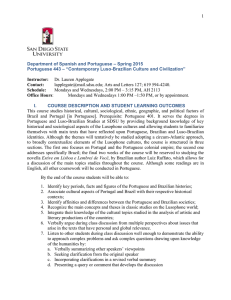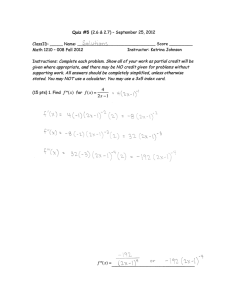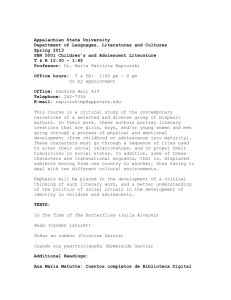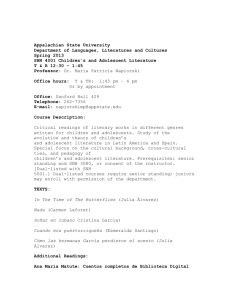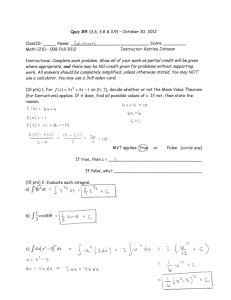PORT 201: Elementary Portuguese II Office Hours: Syllabus
advertisement
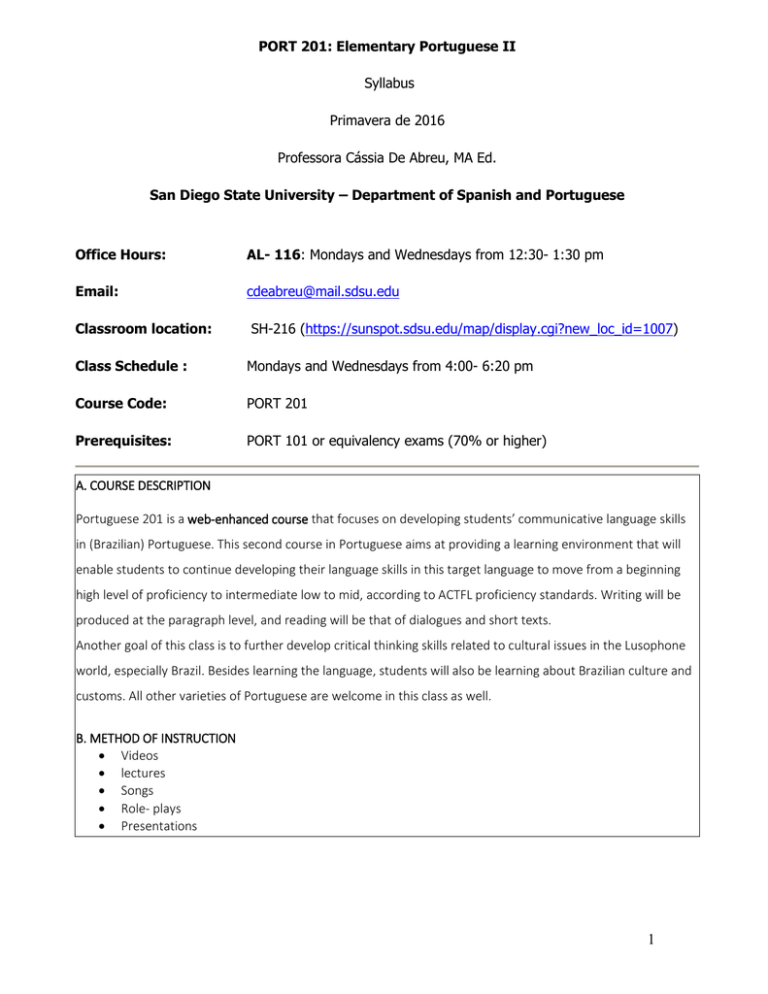
PORT 201: Elementary Portuguese II Syllabus Primavera de 2016 Professora Cássia De Abreu, MA Ed. San Diego State University – Department of Spanish and Portuguese Office Hours: AL- 116: Mondays and Wednesdays from 12:30- 1:30 pm Email: cdeabreu@mail.sdsu.edu Classroom location: SH-216 (https://sunspot.sdsu.edu/map/display.cgi?new_loc_id=1007) Class Schedule : Mondays and Wednesdays from 4:00- 6:20 pm Course Code: PORT 201 Prerequisites: PORT 101 or equivalency exams (70% or higher) A. COURSE DESCRIPTION Portuguese 201 is a web-enhanced course that focuses on developing students’ communicative language skills in (Brazilian) Portuguese. This second course in Portuguese aims at providing a learning environment that will enable students to continue developing their language skills in this target language to move from a beginning high level of proficiency to intermediate low to mid, according to ACTFL proficiency standards. Writing will be produced at the paragraph level, and reading will be that of dialogues and short texts. Another goal of this class is to further develop critical thinking skills related to cultural issues in the Lusophone world, especially Brazil. Besides learning the language, students will also be learning about Brazilian culture and customs. All other varieties of Portuguese are welcome in this class as well. B. METHOD OF INSTRUCTION Videos lectures Songs Role- plays Presentations 1 Group projects (pair work, small groups) Others, as defined by instructor along the semester C. REQUIRED TEXTBOOKS: Ponto de Encontro: Portuguese as a World Language (second edition): (LIÇÕES SEIS A DEZ = 5 chapters) Myportugueselab.com Apostila PORT 201 by Cassia De Abreu – published by University Readers. (Online purchase only). D. SUPPLEMENTARY MATERIALS Portuguese-English dictionary or picture dictionary: It is a good tool for this class. You are welcome to use online dictionaries as well. E. GRADING PLAN 5 homework assignments (100 pts) One partial test (50 pts) One Midterm (2 parts: listening comprehension (25 pts) and grammar/vocabulary (75 pts)) One Midterm project: Talent Show (50 pts) Final Cumulative Written exam (100 pts) One final group Project (50 pts) F. GRADING SCALE Evaluations Number PPA TEMAS DE CASA 5.00 20.00 TESTE UM 1.00 Midterm (Listening) Midterm (Written) SHOW DE TALENTOS 50.00 TTPA 100.00 50.00 1.00 25.00 25.00 1.00 75.00 75.00 50.00 50.00 1.00 EXAME FINAL 1.00 100.00 100.00 PROJETO FINAL 1.00 50.00 50.00 2 TOTAL: 450.00 Atividades Culturais (Opcionais) Os eventos tradicionais lusófonos que acontecem em San Diego nesta época são: >> Carnaval do Brasil: Tornem-se amigos do grupo SDSU BATE-PAPO para ter acesso a informações sobre tais eventos via Facebook. >>Festa Portuguesa em Point Loma: “The festa in Point Loma is based on Santo Amaro's day, but is an excuse for the Portuguese from all around the region, and around the country to get together once a year”. It takes place in May. Fonte: http://www.travbuddy.com/travel-blogs/72746/ >> Vídeo-clipe da festa portuguesa: http://www.youtube.com/watch?v=0k215_kjGes Se vocês ouvirem falar de algum outro acontecimento dentro da comunidade lusófona, compartilhemno no grupo de Facebook: SDSU BATE-PAPO. STUDENT LEARNING OUTCOMES (SLOs): 1. Hold a conversation, ask, and answer questions about their childhood and other past events at the Intermediate Low level of proficiency as per ACTFL guidelines. (Interpersonal Mode) 2. Write and deliver a presentation (whole-class or in small groups) describing past personal events and celebrations at the Intermediate Low level of proficiency as per ACTFL guidelines. (Presentational Mode) 3. Use technology to locate and read general interest articles in the target language websites on familiar selected topics in order to identify main ideas and several supporting details. (Technology Objective/interpersonal Mode) 4. Identify values and social conventions of the target culture. (Cultural Objective) According to ACTFL (American Council on the Teaching of Foreign Languages), the description of a learner at an Intermediate Low level of proficiency is: Speakers at the Intermediate-Low level are able to handle successfully:A limited number of uncomplicated communicative tasks by creating with the language in straightforward social situations. Conversation is restricted to some of the concrete exchanges and predictable topics necessary for 3 survival in the target language culture. These topics relate to basic personal information covering, for example, self and family, some daily activities and personal preferences, as well as to some immediate needs, such as ordering food and making simple purchases. At the Intermediate-Low level, speakers are primarily reactive and struggle to answer direct questions or requests for information, but they are also able to ask a few appropriate questions. Intermediate-Low speakers express personal meaning by combining and recombining into short statements what they know and what they hear from their interlocutors. Their utterances are often filled with hesitancy and inaccuracies as they search for appropriate linguistic forms and vocabulary while attempting to give form to the message. Their speech is characterized by frequent pauses, ineffective reformulations and self-corrections. Their pronunciation, vocabulary and syntax are strongly influenced by their first language but, in spite of frequent misunderstandings that require repetition or rephrasing, Intermediate-Low speakers can generally be understood by sympathetic interlocutors, particularly by those accustomed to dealing with non-natives. (source: ACTFL Speaking Guidelines, revised 1999) G. COURSE COMPONENT SPECIFICS Plagiarism Statement: “Academic dishonesty of any type by a student provides ground for disciplinary action by the instructor or college. In written work, no material may be copied from another without proper quotation marks, footnotes and appropriate documentation”. ATTENDANCE AND TARDINESS POLICY Attendance: Students are expected to attend every class meeting, to arrive on time and stay throughout the class period. Not attending classes on a regular basis may lead to low learning outcomes. MISCELLANEOUS: DROPPING THE COURSE: There is a specific deadline for a faculty member to drop students who fail to attend the first class session and are not in class at the very beginning of the second class session. Please, check with the Registrar’s office to learn more on how to reenroll in a course you have been dropped from due to absences. Faculty Drop – have the option to drop you from their course for non-attendance or lack of required prerequisites. 4 (SOURCE: http://arweb.sdsu.edu/es/registrar/schedule_adjustment.html) Assignments and contents covered: You will be responsible for checking with other classmates what was covered on the day you were absent or late, as well as what assignments were given. Visitors: Please, do not bring your friend(s), relatives, pets or children to class. They will not be allowed to stay. Service animals are excused with proper documentation. Personal Electronic Equipment: Wireless phones, PDAs, IPODs, pagers, beepers as well as any other electronics must be turned off as students enter the classroom. You are not allowed to wear headphones while class is in session. Eating and drinking: No eating allowed in the classroom. Drinks (non-alcoholic) are allowed as long as the contents are in a capped bottle or lidded cup. Cheating: Cheating in a test results in an automatic “F” grade on the test or exam. Permission to tape class: If you know you will have to miss a class and would like to have the class taped for your own review later speak to the instructor prior to the date this will happen. You must provide the voice recorder and the tape (if needed). Let the instructor know who is going to be in charge of the recorder for you. Professionalism: Professionalism is pivotal to the advancement of your career. It includes punctuality, preparation, organization, positive participation and consistent willingness to assume personal responsibility for your learning. MAKE - UP TESTS There are no make-up tests or exams. A make-up test/exam can only be given if you know ahead of time you will not be able to come to take a test and you notify the instructor before the day of the test. The make-up test will be schedule to a date immediately following the original test date. If you have a plausible and verifiable justification, please do not hesitate to discuss it with me. 5 HOMEWORK ASSIGNMENTS No homework assignments will be accepted or considered for grading if late. If you have a plausible and verifiable justification, please do not hesitate to discuss it with me. H. CLASSROOM RULES OF CONDUCT: Sexist, racist, and/or homophobic comments area offensive and inconsistent with an academic atmosphere; they will have no room in this class. Bullying will have no room in this class. Students involved in situations related to bullying or harassment of any sort will be asked to leave the classroom for the entire period in question. The instructor reserves the right to suspend a student who bullied or harassed another for up to 3 classes or according to recommendation of this higher education institution. Give your full attention when others are speaking. Keep in mind that participating includes taking turns, so even if you have a lot to say give others the space to contribute too. Please do not start packing up until class is formally over for the day. 6 I. TENTATIVE CALENDAR: WEEKLY CALENDAR HOMEWORK DUE & EXAMS SEMANA 1 LIÇÃO 6 Lição 6: parte 1. January 31. SEMANA 2 LIÇÃO 6 Lição 6: parte 2. February 7 SEMANA 3 LIÇÃO 7 Lição 7: parte 1. February 14 SEMANA 4 LIÇÃO 7 Lição 7: Due February 21 SEMANA 5 LIÇÃO 8 TESTE 1: DIA 22 DE FEVEREIRO Lição 8: parte 1. February 28 SEMANA 6 LIÇÃO 8 Lição 8: parte 2. March 6. SEMANA 7 LIÇÃO 8-9 Lição 9: parte 1. March 13 SEMANA 8 LIÇÃO 9 Lição 9: parte 2. March 20 SEMANA 9 MIDTERMS DIA 21 DE MARÇO SEMANA 10 SPRING BREAK SPRING BREAK SEMANA 11 TALENT SHOW DIAS 4 e 6 DE ABRIL SEMANA 12 LIÇÃO 10 Lição 10: parte 1. 17 DE ABRIL SEMANA 13 LIÇÃO 10 Lição 10: parte 2. 24 de abril SEMANA 14 REVIEW SEMANA 15 Finalize final projects FINAL PROJECTS DIAS 2 e 4 DE MAIO FINAL EXAM DATE: MONDAY, MAY 9TH 3:30- 5:30 PM 7

